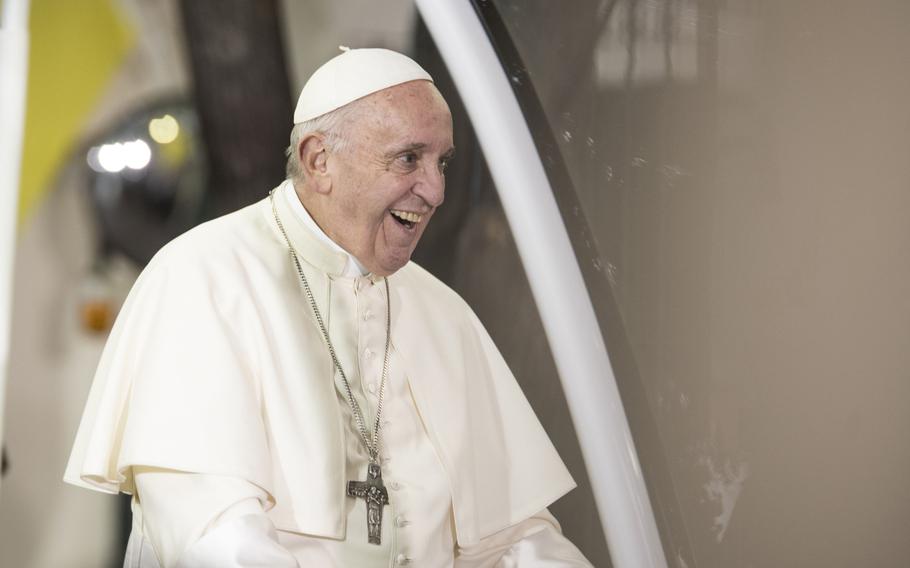
Pope Francis smiles at supporters outside the Vatican Apostolic Nunciature in Santiago, Chile, on Jan. 15, 2018. (Tamara Merino/Bloomberg)
Pope Francis warned the leader of the Russian Orthodox Church not to be “Putin’s altar boy” and justify the Russian president’s invasion of Ukraine.
In a Tuesday interview with the Italian newspaper Corriere della Sera, Francis said he spoke with Patriarch Kirill, a key supporter of Vladimir Putin and his war, for 40 minutes over Zoom. During the March 16 conversation, Francis said, Kirill was listing off all the justifications for the war from a sheet of paper he was holding.
“I listened and then told him: I don’t understand anything about this,” Francis said. “Brother, we are not state clerics, we cannot use the language of politics but that of Jesus. We are pastors of the same holy people of God. Because of this, we must seek avenues of peace, to put an end to the firing of weapons.”
Then, Francis, who has repeatedly called for an end to the war, went one step further and challenged Kirill not to follow along with the actions of the Russian president.
“The patriarch cannot transform himself into Putin’s altar boy,” the pope said.
The Russian Orthodox Church, in a statement released Wednesday, responded, “It’s regrettable that a month and a half after the conversation with Patriarch Kirill, Pope Francis chose the wrong tone to convey the content of this conversation.”
The statement said that Kirill had sought to help the pope see the pro-invasion point of view, repeating Russian claims about attacks on Russian speakers in Ukraine.
Kirill then told Francis that “promises were not kept” about NATO not expanding after the end of the Soviet era.
The statement noted that “the Pope said, in agreement with the Patriarch, that ‘The Church must not use the language of politics, but the language of Jesus.’ Pope Francis added that ‘we are shepherds of the same Holy People who believe in God, in the Holy Trinity, in the Holy Mother of God: that is why we must unite in the effort to aid peace, to help those who suffer, to seek ways of peace, and to stop the fire.’ “
Kirill, 75, was elected in 2009 as patriarch of the influential Russian Orthodox Church, which has more than 100 million followers. Orthodox Christianity is the dominant faith in both Russia and Ukraine - but since the war the church has contributed to a rift between Moscow and Kyiv, as Kirill has dug his heels into pro-war rhetoric.
Last month the patriarch stood before a main cathedral for the Russian armed forces and called on Russian soldiers to “love our fatherland . . . protect it, as only Russians can defend their country.” He described those affected by the conflict in Ukraine as “people of Holy Russia. They are our brothers and sisters.” He’s lauded military service as “an active manifestation of evangelical love for neighbors.”
In the past decade, Russia’s geopolitical ambitions have been tied up with faith, as Putin began embracing the church for political gain. The relationship between Kirill and Putin helped lay the foundations of the war as they both echoed each other’s rhetoric to justify Russia’s actions in Ukraine. As Putin used the language of faith to cloak his political and military ambitions, Kirill also used sermons to rationalize the campaign on spiritual grounds.
Kirill’s tenure has proved divisive, as priests across Ukraine and Europe have condemned his support for the war. Nearly 300 priests and deacons of the Russian Orthodox Church signed an open appeal calling for reconciliation and an immediate cease-fire. In Ukraine, more than 320 priests signed another letter accusing the patriarch of preaching “heresy” and committing “moral crimes by blessing the war against Ukraine,” and asking church leaders to decide on whether the patriarch should be deposed.
Kirill, who once described Putin’s leadership as a “miracle of God,” faces possible sanctions from the European Commission over his support of the invasion, according to Agence France-Presse. The New York Times also reported that the European Union plans to sanction the patriarch, according to diplomats who have reviewed the document. To the outlet, a senior spokesman for the Russian Orthodox Church compared the sanctions to decades of repressions suffered by the church under Soviet rule.
Francis also noted that he has requested a meeting with Putin, expressing readiness to come to Moscow for a meeting with Putin. “We have not yet had an answer, and we are still insisting,” the pope said.
Kremlin spokesman Dmitry Peskov told journalists Wednesday that “no agreements on meetings” have been made, Russian news agency Tass reported.
- - -
The Washington Post’s Chico Harlan contributed to this report.